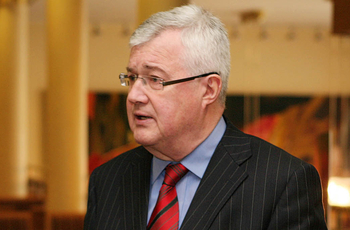
William Slattery
‘France and Germany agreed among themselves to exclude the UK from influence in the post financial crisis period in EU. The parties in power in both of those countries were both members of the CDU European political group, which was also the majority party in the European Parliament. Michel Barnier, a member of the CDU French affiliate was appointed as financial services Commissioner, and the CDU had a majority on ECON - the European Parliament Committee. responsible for financial services. It locked in place the dirigiste approach of the French post crisis’.
‘When the new Commission was established in 2013 they recanted, putting Lord Hill in as financial services Commissioner. It was too late unfortunately. Cameron had already called for the fatal exit referendum, followed by some unfortunate interchanges with the likes of Barroso's successor Jean Claude Juncker talking about 'Anglo Saxons' and so on.’
‘The latest provocation is that of Malstrom, the EU Trade Commissioner suggesting that the two years of negotiations following the submission of the Article 50 request to leave by the British would focus only on the terms of exit. This would be followed by years of negotiations on a new relationship, with the proposal being that, pending the conclusion of those discussions, the UK trade status with the EU would be no closer than any ordinary member of the World Trade Organisation.
‘This is an extremely dangerous proposal which would lead to maximum economic disruption. It is unlikely that Malstrom would have suggested this without running it past Juncker or his Cabinet first’.
Lord Hill's resignation is another unfortunate, and unnecessary, consequence of the Brexit aftershocks, he believes. ‘There was no necessity for him to have resigned - he should have stayed in,’ he says. ‘Britain has not invoked Article 50, and the Brussels FS Directorate could have done with his leadership input. His replacement, Dombrovskis is not a financial services expert, unfortunately. His heart is in the right place, admittedly, he brought Latvia through its financial crisis, but he will be on a steep learning curve.
‘Meanwhile, Britain has no Commissioner through the critical period of its negotiation post the Article 50 trigger. It is ridiculous,’ he says.
Echoing the words of Denmark's Financial Regulator, lamenting the loss of the likes of Bank of England Governor Mark Carney in the wider EU monetary policy forum, Slattery says that Europe, and Ireland, will miss the 'intellectual leadership' of the UK at so many levels, not least in financial services.
He is balefully unimpressed by assertions that the remaining countries, 27 strong after all, will, or can, make up the difference. ‘How could we replace them? They would be impossible to replace,’ he says.
As for the Irish, he says, ‘in practice we lined up with the UK on a lot of issues in Europe; our interests were aligned with them. In financial services they were the intellectual powerhouse in Europe.’
So what for the Irish-British relationship in a post Brexit financial services world? ‘Going forward, we will still have close relationships with the financial services authorities, the Bank of England, Treasury, the FCA, PRA, and there is still a lot of connectivity between them and the Irish financial services centre.’
Does he see British membership of the EEA evolving in a way that will lead that to be a more significant force in the future, perhaps? ‘The British leaving is not a foregone conclusion. Although currently the mood is not there for recanting - the British electorate's view on Brexit may well change in the months to come if the negative economic consequences of Brexit become more evident. ‘My hope is that they will not leave, but if they do it should be as close as possible to EEA status as is possible. That will involve them accepting the free movement of labour, perhaps as the price of access to the single market within the EEA, which would include, I would expect, membership of the single market for financial services. That outcome would be good for us, and it would be good for the UK industry, from the point of view of its firms.
‘In that light, it's my hope that the IDA and the Irish Government will lead positive engagement in the process from all of our authorities. We need to establish a clear view on this in the weeks to come, and I am certain that there will not be a satisfactory resolution of the situation without the UK continuing to have access to the single market.’
